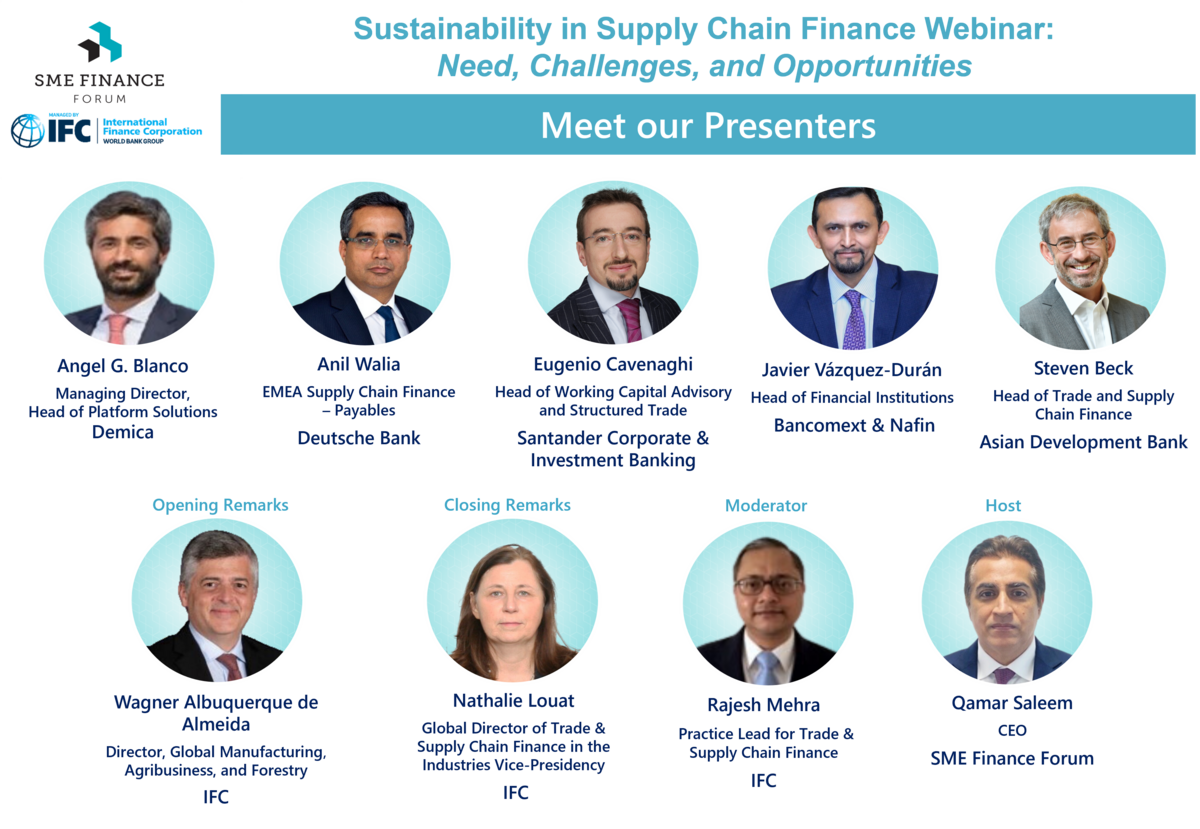Blog
Supply Chain Finance Innovations: Technology Platforms
Oct 06, 2020

A webinar summary.
With the digitization of the supply chain, several technologies, such as Artificial Intelligence and machine learning, have been developed to help financial institutions and other partners reduce risk, lend more efficiently, and connect customers to suppliers. The SME Finance Forum hosted a webinar last week to understand how supply chain finance has been transformed by the application of technology. Claudia Perri (HPD Software), Vahid Monadjem (Nomanini), and Ken So (Flowcast) joined the panel to share their practices and showcase how they leverage innovative infrastructure and smart data for faster, cheaper, and more efficient credit solutions in Asia, Africa, Europe and the Americas. The discussion was moderated by Margarete Biallas (IFC).
Claudia Perri of HPD LendScape demonstrates how technology and digital marketplace have changed supply chain financing. LendScape is a specialist platform that offers holistic working capital financial solutions such as factoring, discounting, supply chain finance, and asset-based lending. The single-platform interconnects parties, including funders, buyers, and suppliers, and enables users to exploit new opportunity in the market seamlessly and securely. In addition, the software is implanted with multiple languages and is designed to cope with various regulatory requirements in different jurisprudences. With its easy configuration, customizability, and efficient deployment either locally on premise or hosted by HPD, LendScape aims to enhance the choice through dynamic, intelligent risk mitigating working capital and bring businesses new experiences in supply chain financing1. In the future, the millennial generation entrepreneurs and leaders are expecting more online, mobile-based, personalized and self-service financial services and products, and HPD LendScape has been in the process of adapting to these trends. Open Banking and AI are background items in HPD LendScape roadmap and the platform already counts a number of integrations in this area allowing open accounting connections, external machine-learning payment allocations and self-service mobile access to finance with a click or Alexa voice commands. To cope with SCF challenges of certain regions such as Middle East or other emerging markets, LendScape now supports a more transparent self-onboarding system with flexible KYC and AML checks, where the multi-funders can monitor the progress and administrate their own portfolio of buyers and suppliers.
Vahid Monadjem focuses on how Nomanini has combined new digital financial services with existing distribution networks in Africa. The pioneering fintech platform serves as a connection between merchants, distributors, and service providers across the continent, and integrates payments, working capital, and data analytics. In Sub-Saharan Africa, 86% of retail transactions occur through informal channels and there are more than 150 million informal retailers in emerging markets globally. The informal retail economy possesses three key features: reliance on cash, lack of working capital, and fragmented value chain, and these have imposed difficulties in the informal retailers’ business operations. The MSMEs continuously face challenges in supply chain financing due to insufficient date for credit scoring, need for collateral, complex fee structures, as well as lengthy loan terms. Nomanini provides various tools to address the data and credit scoring issues, for example, it extracts indices of retail wealth from key transactions to profile a merchant and predict its prospect. The FinTech platform also provides short-term loans ranging from five to thirty days, which bridges the gap between the existing loan products and the actual needs of informal retailers. Nomanini has leveraged strategic partnerships to deliver a business banking wallet and a digital stock advance solution for informal retailers at scale. The informal retailers now have access to digital tools and working capital; on the other hand, their relationship with FMCG distributers is optimized through the platform. Since its foundation, Nomanini has processed more than 10 million transactions with less than 1% loan default rate. The new platform has also contributed to around 30% increase in trade activity by informal retailers.
Ken So is the founder of Flowcast, a FinTech startup that provides AI and machine learning solutions for financial institutions to power smarter credit decisions. Traditionally, banks have limited visibility in terms of risk in its financing processes and have to rely on other products, such as credit insurance, for the purpose of risk management. AI and machine learning can enhance banks’ visibility and therefore allow them to extend and optimized capital to their clients. The traditional underwriting only reveals the financial information of banks’ potential clients, which can be unreliable. The AI-powered process goes beneath the ‘iceberg’ and draw out the historical transaction data, proprietary data, and third-party data. By providing a comprehensive overview of a business’ performance to the bank, the AI-powered underwriting ultimately offers SMEs access to more capital and opportunity for financial inclusion. Flowcast evaluates the credit score and performance score of businesses in milliseconds for real-time decisions and actively monitors the risk with minimum manual effort. The platform then displays the predictive insights on an analytics dashboard, which is used by the officers and the risk team as an important reference in final decision-making. Flowcast is currently partnering with some of the largest global banks and corporate in Asia and Europe, equipping them with the ability to enhance credit risk management.
During the webinar IFC also announced that it will publish a handbook for financial institutions explaining the influence of technology on supply chain finance and how it can be leveraged.
This handbook is intended to provide guidance on the use of technology in supply chain finance to financial service providers and is also illustrated by case studies on Flowcast and Nomanini.
The spread of digital tools for business and finance, and the increasing availability of data on both business and financial interaction, is a boon to the development and deployment of supply chain finance. Digitized supply chain interactions are providing useful and valuable information to design new products and manage financial risk more effectively. Growing digital connectivity between even the smallest businesses allows SCF providers to offer services to businesses that previously lacked access to financial resources that would better enable them to run their businesses. Data analytics and platform services enable the processing of data and delivery of funds to be highly automated, thereby increasing productivity and efficiency for both financial institutions and their clients, while reducing costs to onboard. Such gains lend credence to the belief that providing supply chain finance to smaller businesses is both viable and no longer reliant on a single corporate as off-taker to provide finance to their respective suppliers or distributors.
The handbook was written with the expectation that the audience will benefit from illustrations of how digital technology has changed supply chain operations, and the implications on supply chain finance as well as the new opportunities this presents for banks and their customers — especially those enterprises that have been excluded from traditional financial products and services. It is further expected that these shared experiences and lessons learned from the pioneers in these markets will augment and serve the text as evidence accrued first-hand.
Finally, this handbook seeks to help guide financial institutions that are considering adopting digital innovations to establish or expand their supply chain finance portfolios. It is intended for those decision-makers and product managers who determine which digital innovations will be suitable to their clients and operations.











